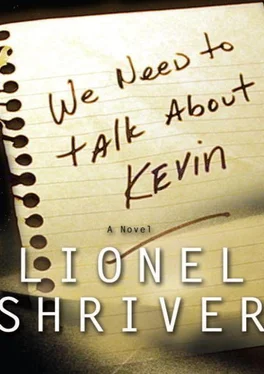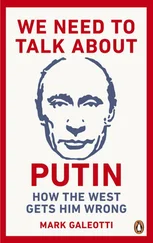This voracity of his may go some distance toward explaining his cruelty, which among other things must be an inept attempt at taking part. Having never seen the point—of anything—he must feel so brutally left out. The Spice Girls are dumb , Sony Playstations are dumb , The Titanic is dumb , mall cruising is dumb , and how could we disagree? Likewise, taking photos of the Cloisters is dumb , and dancing to “Stairway to Heaven” in the latter 1990s is dumb . As Kevin approached the age of sixteen, these convictions grew violent.
He didn’t want to have to answer your Big Question, Franklin. He wanted an answer from you. The glorified loitering that passes for a fruitful existence appeared so inane to Kevin from his very crib that his claim last Saturday that he was doing Laura Woolford “a favor” on Thursday may have been genuine.
But me, I’m superficial. Even once the shine was off travel, I could probably have sampled those same old foreign foods and that same old foreign weather for the rest of my life, just so long as I flew into your arms at Kennedy when I came home. I didn’t want much else. It is Kevin who has posed my Big Question. Before he came along, I’d been much too busy attending to a flourishing business and a marvelous marriage to bother about what it all amounted to. Only once I was stuck with a bored child in an ugly house for days on end did I ask myself what was the point.
And since Thursday ? He took away my easy answer, my cheating, slipshod shorthand for what life is for.
We last left Kevin at the age of fourteen, and I’m getting anxious. I may have dwelt so on his early years to stave off rehashing the more recent incidents that set you and me so agonizingly against one another. Doubtless we both dread wading back through events whose only redeeming feature is that they are over. But they are not over. Not for me.
During the first semester of Kevin’s ninth-grade year in 1997, there were two more School Shootings: in Pearl, Mississippi, and Paducah, Kentucky, both small towns I had never heard of, both now permanently marked in the American vocabulary as synonyms for adolescent rampage. The fact that Luke Woodham in Pearl not only shot ten kids, three fatally, but killed his mother—stabbing her seven times and crushing her jaw with an aluminum baseball bat—may have given me an extra private pause. (Indeed, I remarked when the reports first started pouring in, “Look, all they do is go on and on about how he shot those kids. And then, oh, by the way, he also murdered his mom. By the way? It’s obvious that the whole thing had to do with his mother.” This, in due course, was an observation that would qualify in legal terms as admission against interest .) Still, I’m not so pretentious as to impute to myself during that period a sense of deep personal foreboding, as if I perceived these repeated tragedies on the news as an inexorable countdown to our own family’s misfortune. Not at all. Like all news, I regarded it as having nothing to do with me. Yet like it or not, I had morphed from maverick globetrotter to one more white, well-off suburban mother, and I couldn’t help but be unnerved by deadly flights of lunacy from fledglings of my own kind. Gangland killings in Detroit or L.A. happened on another planet; Pearl and Paducah happened on mine.
I did feel a concentrated dislike for those boys, who couldn’t submit to the odd faithless girlfriend, needling classmate, or dose of working-singleparent distraction—who couldn’t serve their miserable time in their miserable public schools the way the rest of us did—without carving their dime-a-dozen problems ineluctably into the lives of other families. It was the same petty vanity that drove these boys’ marginally saner contemporaries to scrape their dreary little names into national monuments. And the self-pity! That nearsighted Woodham creature apparently passed a note to one of his friends before staging a tantrum with his father’s deer rifle: “Throughout my life I was ridiculed. Always beaten, always hated. Can you, society, blame me for what I do?” And I thought, Yes, you little shit! In a heartbeat!
Michael Carneal in Paducah was a similar type—overweight, teased, wallowing in his tiny suffering like trying to take a bath in a puddle. But he’d never been a discipline problem in the past; the worst he’d ever been caught at theretofore was watching the Playboy video channel. Carneal distinguished himself by opening fire on, of all things, a prayer group. He managed to kill three students and wound five, but judging from the cheek-turning memorial services and merciful banners in classroom windows—one of which embraced photos not only of his victims but of Carneal himself with a heart—the born-again got theirs back by forgiving him to death.
The October night that news of Pearl came in, I exploded as you and I watched the Jim Lehrer Newshour. “Jesus, some kid calls him a fag or pushes him in the hallway, and suddenly it’s ooh, ooh, I’m gonna shoot up the school, I’m gonna crack from all this terrible pressure! Since when did they make American kids so soft?”
“Yeah, you gotta ask yourself,” you agreed, “whatever happened to heading out to the playground to duke it out?”
“Might get their hands dirty.” I appealed to our son as he glided through on the way to the kitchen; he’d been eavesdropping, which as a rule he preferred to participating in family conversations. “Kevin, don’t boys at your school ever settle their differences with an old-fashioned fistfight?”
Kevin stopped to regard me; he always had to weigh up whether anything I asked him was worthy of reply. “Choice of weapons,” he said at last, “is half the fight.”
“What’s that supposed to mean?”
“Woodham’s weak, flabby, unpopular. Fistfight’s low percentage. A doughboy’s got way better odds with a 30 millimeter. Smart call.”
“Not that smart,” I said hotly. “He’s sixteen. That’s the cutoff in most states for being tried as an adult. They’ll throw away the key.” (Indeed, Luke Woodham would be given three life sentences, and 140 extra years for good measure.)
“So?” said Kevin with a distant smile. “Guy’s life is already over. Had more fun while it lasted than most of us ever will. Good for him.”
“Cool it, Eva,” you intervened as I sputtered. “Your son’s pulling your leg.”
For most of his life, Kevin’s troubles, too, remained on a minor scale. He was bright but hated school; he had few friends, and the one we knew was smarmy; there were all those ambiguous incidents, from Violetta to let-uscall-her-Alice, that set off alarm bells at a volume only I seemed able to hear. Yet character expresses itself with remarkable uniformity, be it on a battlefield or in the supermarket. To me, everything about Kevin was of a piece. Lest my theories about his existential disposition seem too highfalutin, let’s reduce the unifying glue to one word: spite . Consequently, when two Orangetown policemen showed up at our door on that night in December 1997 with Kevin and the unsavory Leonard Pugh in tow, you were shocked, while I regarded this constabulary visit as overdue.
“What can I do for you, officers?” I overheard.
“Mr. Khadourian?”
“Plaskett,” you corrected, not for the first time. “But I am Kevin’s father.”
Having been helping Celia with her homework, I crept up to hover behind you in the foyer, buzzing from voyeuristic excitement.
“We had a motorist phone in a complaint, and I’m afraid we found your son and his friend here, on that pedestrian overpass over 9W? We had to run these two down, but it seemed pretty obvious that they were the kids throwing detritus onto the roadway.”
Читать дальше












